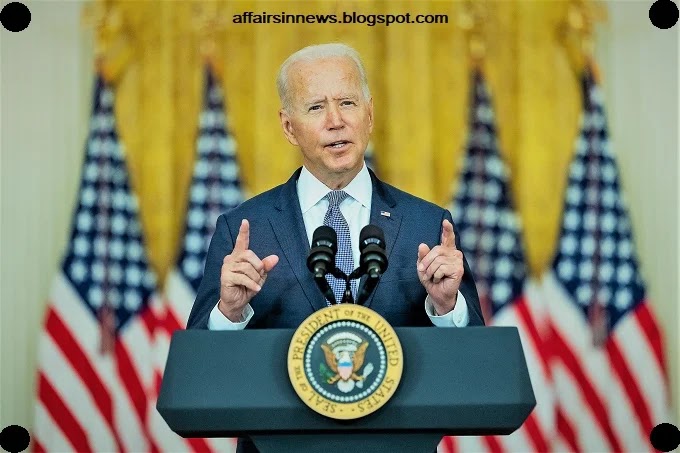The rapid clearance of the ultra-long bill highlights the failure of the US system
US President Joe Biden recently signed the fiscal year 2023 comprehensive appropriations bill, once again avoiding the federal government shutdown due to funding problems at the last moment. Analysts believe that the $1.7 trillion bill, more than 4,000 pages in length, is still cleared in the face of great controversy, indicating that the failure of the American system caused by sharp partisan struggle has reached a new height.
The two parties are deeply divided
Members of the Democratic and Republican parties in the US Congress are much divided on the content of the appropriation bill. Senate Majority Leader Democrat Schumer said it was one of the most important appropriation bills enacted by Congress in a long time, reflecting strong support for American families, workers and the defense sector. Republicans blasted Democrats for overspending, creating huge fiscal deficits. With Republicans set to regain control of the House of Representatives in January 2023, some Republicans have even refused to discuss government spending with Democrats at this time.
For weeks, House Minority Leader Republican Kevin McCarthy has insisted on delaying debate on the omnibus appropriations bill until January 2023, and even publicly criticized Senate Republican leader McConnell for engaging with Democrats.
When the Democratic-controlled House voted on the bill, McCarthy delivered a lengthy speech during the debate, denouncing the bill as costly and only making the immigration crisis worse at the U.S. border, worse inflation, and more chaotic federal government.
The government almost shut down
The Consolidated Appropriations Act stipulates the scale and use of expenditures by various departments of the U.S. federal government in each fiscal year, and involves the issue of federal government operating funds, which is of great importance. Due to the huge bipartisan differences, the final version of the new fiscal year consolidated appropriations bill has been delayed. As an alternative, the House of Representatives and Senate passed a temporary appropriations bill on December 14 and 15, 2022, respectively, to temporarily avoid a shutdown for the federal government.
It was not until the afternoon of the 22nd of that month that the consolidated appropriations bill passed the Senate with difficulty, leaving less than two days for the House to vote and Biden to sign; On the afternoon of the 23rd, the House of Representatives approved the bill at the last minute after a more fierce verbal battle, but the voting results were basically drawn along party lines; On the evening of the 23rd, there was not enough time for the bill to complete the final signature process, and the federal government faced a shutdown at 0:00 on the 24th, and Biden had to sign another short-term appropriations bill, allowing the federal government to operate for another week to the 30th.
On December 27, Biden traveled to St. Croix in the U.S. Virgin Islands for a vacation. The White House did not receive the bicameral approval version submitted by Congress until the 28th, and submitted it to Biden for signature on the 29th. At this time, there is only one day left before the federal government faces another shutdown.
Highlight institutional failures
Although the bill came into effect dangerously, it still faced constant criticism. Some lawmakers argue that the bill is lengthy and involves a lot of unnecessary spending, and that the congressional leadership should have published the bill sooner rather than forcing lawmakers to vote within days of getting the text of the bill.
Republican Senator Ron Johnson of Wisconsin said it was impossible for anyone to read such a lengthy text of the bill. Senator Rick Scott, Republican of Florida, complained that the bill was three times as long as the Bible.
In Johnson's view, the bill's approval shows that Washington's dysfunction and cynicism have reached new heights. He said Congress had violated a long-standing rule that increased mandatory spending must be offset by additional taxes. As a result, the federal government will continue to run large fiscal deficits, and we are mortgaging the future of the next generation.
A poll conducted by the Associated Press recently showed that more than half of respondents believe that American-style democracy is failing. A voter named Adam Coekendall bluntly noted that now everything is more divisive, more polarized, more partisan, and [politicians] are not serving the electorate.
 |
| JOSEPH ROBINETTE BIDEN JR. - THE 46TH AND CURRENT PRESIDENT OF THE UNITED STATES |
U.S. economist: The United States may face a recession in 2023
On January 1, local time, Michael Gapen, chief economist of Bank of America, said in an interview with the media that 2023 will be difficult for Americans, and he expects that the United States may face a recession in 2023.
Gabon said that the risk of a recession in the United States in 2023 is high, because usually, when government policies tighten and push up interest rates to ease inflationary pressures, it often means that people will usher in a period of high unemployment, and a recession will follow. However, Gabon also said that the United States also has a chance to avoid a recession. Gabon added that in the current situation, it may take another two to three years for inflation to fall to pre-pandemic levels.
High inflation has caused the American people to suffer - US executives: Many people's American dreams will be shattered
In 2023, the probability of a recession in the United States will rise to about 50%. This is what the Fed announced at the November monetary policy minutes meeting on the 23rd, and it is also the first time that it has clearly raised the risk of recession next year.
Looking back, the Fed has raised interest rates six times this year (including four consecutive 75 basis point hikes), accumulating 375 basis points. The Fed claims that the original intention of continuously raising interest rates is to control inflation, but now the inflation figure has reached a high of 8%, and inflation is still at a nearly 40-year high.
The recession seems to have been traced for a long time.
Data released Friday by the National Association of Realtors showed that existing home sales fell 5.9 percent month-on-month in October and 28.4 percent from a year earlier. This is the lowest level since May 2020 and the longest consecutive decline in existing home sales on record. NAR said the highest mortgage rates in more than a decade continued to squeeze buyers out of the market.
Meanwhile, an economic index that measures the U.S. business cycle slipped in October, adding evidence of a possible impending recession.
On November 18, local time, the U.S. Economic Conference Bureau issued a document that the U.S. Leading Economic Index (LEI) fell 0.8% in October, worse than the expected -0.4% and the previous value -0.4%.
In this regard, the explanation given by the official website is that the US LEI index has fallen for the eighth consecutive month, indicating that the economy may fall into recession.
Ataman Ozyildirim, senior director of economic research at the Large Business Institute, said: The decline in the index reflects consumers' lack of optimism about the outlook amid high inflation and rising interest rates.
To be sure, high inflation has affected countless households.
The Federal Reserve reported on Tuesday that debt has soared over the past year due to high inflation combined with rising interest rates and strong consumer demand. Total debt jumped by $351 billion between July and September, the largest quarterly increase since 2007. As a result, the collective household IOU in the United States reached a new record of $16.5 trillion. This represents an increase of 2.2% from the previous quarter and 8.3% from a year ago.
In the job market, it is also bleak. U.S. initial jobless claims last week were 240,000, the biggest increase since the week of August 13, 2022, and were estimated at 225,000 versus 222,000 in the previous month. The U.S. real unemployment rate exceeded 23.6 percent in October, up 1.3 percentage points from the previous month and the largest month-over-month increase since the pandemic in April 2020, according to the Associated Press. Gene Ludwig, president of LISEP, spoke of the difficulties low- and middle-income workers are having in paying for basic necessities.
Dave Gilbertson, vice president of payroll management company UKG, recently lamented: A large part of the American dream will be shattered, and they will not find the position they want.
Barry Sternlicht, chairman and CEO of Starwood Capital Group, said the Fed's rate hikes would hurt the economy more than expected. The impact of the Fed's rate hike will not be immediately apparent. Fearing a recession and weak consumers, the company will cut its budget for 2023. This will increase pressure on companies and may continue to weigh on the stock market.
Long bills in the face of high inflation. Perhaps the American dream has come to naught.
Many American business people spoke: The US recession is coming! People are advised to stock up on cash
Against the background of high inflation and the Federal Reserve's continued strong interest rate hikes since the beginning of last year, the US business community is increasingly worried about the future US economic situation. A number of representative figures in the US business community have spoken out in recent days to warn of a possible economic recession.
Jeff Bezos, founder of Amazon, said in a recent interview with CNN that the recession of the US economy is imminent, and he suggested that in the next few months, people should reduce spending as much as possible and try not to buy large items such as cars and TVs.
The current economic situation looks bad and is starting to slow down. Layoffs are beginning to occur in many areas. It's possible that we're not in a recession yet, but it's going to come soon.
Bezos said that given that the economic situation in the United States will continue to deteriorate, people should reduce large expenses as much as possible and postpone purchases of goods such as TVs, refrigerators, cars and more, and he also advised small business owners to consider delaying investment in new equipment and instead save cash flow as much as possible.
When you're in an economy like this that is constantly inflationary, you can't get out without a real recession. David Solomon, CEO of Goldman Sachs Group in the United States, previously said. According to the US Consumer News and Business Channel, Jamie Dimon, CEO of JPMorgan Chase, another well-known investment bank in the United States, also predicted in October this year that the recession of the US economy will occur in 6-9 months.
According to Greg Jensen, co-chief investment officer of Bridgewater Fund, the world's largest hedge fund, the situation of the impending recession of the U.S. economy may be far worse than the market expects, wait another nine months, or after that, you will see the economy bottom, Jensen said.
Elon Musk, CEO of Tesla Inc., who recently caused a series of topics due to the acquisition of the social platform Twitter, also warned on many occasions that the US economy may usher in a serious recession lasting one to two years. On November 30, Musk tweeted that the trend of the economy is worrying, the Fed needs to cut interest rates immediately, and the Fed is currently continuing to amplify the possibility of a severe recession.
Even more pessimistic than Musk is Nuriel Roubini, a professor of economics at New York University's Stern School of Business and CEO of a macroeconomic consulting firm. Roubini was dubbed Dr. Doom by the media for making pessimistic but correct predictions about the 2008 financial crisis two years in advance, and in his view: Past history has proven that avoiding a hard landing for the economy is an 'impossible task.' He predicted that the US economy will not only face inflation and recession, but also usher in a stagflationary debt crisis.
In response to high inflation, the Fed has raised interest rates several times this year. Since March, there have been six consecutive rate hikes and four consecutive rate hikes of 75 basis points, for a cumulative increase of 375 basis points. On November 30, local time, Fed Chairman Powell delivered a speech at the Brookings Institution in the United States, saying that the fight against inflation is far from over and that the Fed's interest rate hikes will continue for another period of time.








0 Comments
Any question in your mind or a request you want me to fulfill, please don't hesitate, comment below or do email to me.
I will try whatever I can!